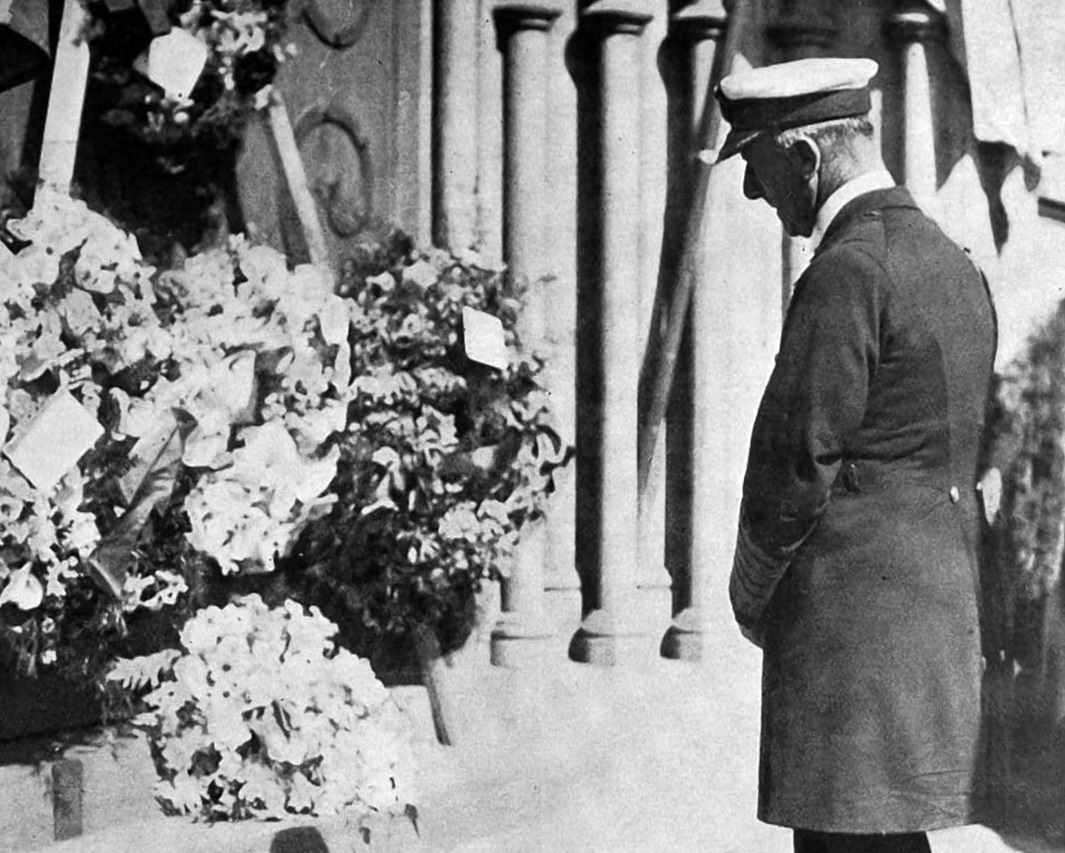
His Excellency was accompanied by Lady Jellicoe and the Hon Lucy Jellicoe, and the Boys’ High School cadets formed the Guard of Honour.

During the afternoon Lord Jellicoe deposited a wreath of arum lilies on the front door of the Cathedral. The inscription on the wreath was: "To the immortal memory of Lord Nelson, Admiral of the fleet. — Viscount Jellicoe and Viscountess Jellicoe.”
Later the Governor-General and Viscountess Jellicoe attended the session of the Synod of the Christchurch Diocese.
Proudly British
Yesterday was Trafalgar Day — Nelson Day, as many people now prefer to call it. Names may not matter much, but historic facts are of perennial import. As a lover of sacred anniversaries I like to note these recurring occasions, fraught as they are with the imperishable sentiment of proud patriotism.
— by ‘Wayfarer’
Faith-based institution
The Anglican Memorial Home for Boys chairman, in moving the annual report, said that it was their duty to increase the scope of their movement on account of the very great difficulties that social workers had experienced. The advisability of increasing the size of the institution had been considered, and there was a certain amount of money available. The chaplain (Rev G.B. Moreton) stated that the home had its full quota of 30 boys. Nine were discharged and six admitted during the year.
One was baptised and three were confirmed, making a total of eight communicants. One boy was sent to learn the carpentering trade, another had been apprenticed to the painting trade, another was working on a dairy farm, and six had been sent out to friends or relatives. During the year the home benefited to the extent of £1000, under the will of the late John Fenton, of Wedderburn. In the public school the boys obtained a good percentage of passes. Under the direction of the manager, the boys were instructed in gardening. A number of the boys were members of St Michael’s Choir. During the month of January a camp was held at Warrington. The Manager (Mr J.S. Gerrard) reported that the health of the boys had been excellent. Every facility was given to the boys to take part in outdoor sports, cricket and football being the principal games. One of the boys represented Otago at football, while three boys gained medals at the primary schools’ sports.
Cleaning up carbon emissions
Heavy north-easterly weather is welcomed as a blessing at Kaka Point, where it brings the residents a commodity which is a drain upon the purses of many families. During the recent bad weather a large quantity of coal was washed up on the beach, and the residents lost no time in transferring it to their homes. A Daily Times reporter was informed that one man had been busy for two days with a dray carting away coal from the beach, and another resident had secured 50 full bags. Many had collected as much as a ton. The coal was mostly of good quality, there being also a little lignite. Various theories had been put forward as to its origin. One was that it came down the Molyneux River; another more probable one was that it came from the outcrop of the Kaitangata mine.
— ODT, 22.10.1924 (Compiled by Peter Dowden)












